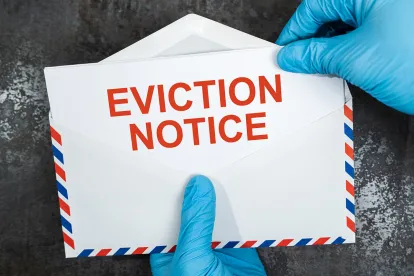On September 2, 2021, New York Governor Kathy Hochul signed into law a new moratorium on evictions and foreclosures for residential tenants and small businesses. Recently, in the case Chrysafis v. Marks, the U.S. Supreme Court enjoined the enforcement of the previous residential moratorium in New York (which expired August 31), finding that the tenant’s ability to self-declare financial hardship while precluding a landlord from contesting that declaration violated the landlord’s due process rights. Additionally, in the case Alabama Association of Realtors v. Department of Health and Human Services, the U.S. Supreme Court held that the CDC exceeded its statutory authority in issuing its latest residential eviction moratorium and blocked the enforcement of such moratorium. In response, and citing the rise in cases due to the Delta variant of COVID-19, the New York legislature passed a new moratorium, which expires January 15, 2022.
The new law largely carries over the provisions of the COVID-19 Emergency Eviction and Foreclosure Prevention Act of 2020 (the “2020 Act”) and the COVID-19 Emergency Protect Our Small Businesses Act of 2021 (the “2021 Act”). The 2020 Act bans eviction and foreclosure proceedings against residential tenants who file a hardship declaration stating that the tenant is experiencing financial hardship due to COVID-19 or that moving would pose a significant health risk to the tenant because of a high-risk household member. Unlike the previous law, however, the new law allows landlords (and foreclosing lenders) to challenge the tenant’s hardship declaration. The modification was intended to address the Supreme Court’s due process concerns. Rather than telling tenants that “you cannot be evicted” until January 15, 2022, it says that “you may be protected from eviction until at least January 15, 2022” and provides landlords (and foreclosing lenders) an opportunity to request a hearing to determine the validity of the tenant’s hardship declaration. If a tenant files a hardship declaration, the landlord (and foreclosing lender) may request a hearing and make a motion attesting a good faith belief that the tenant has not experienced financial hardship, and the court must grant a hearing to determine whether the tenant’s hardship claim is invalid. After the hearing, if the court finds the hardship claim valid, the court will grant or continue a stay on eviction or foreclosure proceedings, provided that the court will direct, if the tenant appears to be eligible and has not yet applied, that the parties apply to the COVID-19 emergency rental assistance program of 2021 or a locally administered program to administer federal emergency rental assistance funds. If the court finds the tenant’s declaration to be invalid, the proceedings will continue to a determination on the merits.
Similarly, the new law provides eviction and foreclosure protections for small businesses, i.e., commercial tenants that are residents in New York, independently owned and operated, not dominant in their field and have 100 (previously 50 in the 2021 Act) or fewer employees. It prohibits eviction proceedings against a small business that has filed a hardship declaration stating that it has lost significant revenue or had significantly increased necessary costs during the pandemic. The new moratorium also prohibits foreclosure proceedings against small businesses that own ten or fewer commercial units if such small business files a hardship declaration. Commercial landlords and lenders may also challenge the small business’ hardship declaration in a hearing, and eviction and foreclosure proceedings will only be postponed to January 15, 2022, if the court finds that the hardship claim is valid.
We will continue to keep you apprised of any further developments.





 />i
/>i

